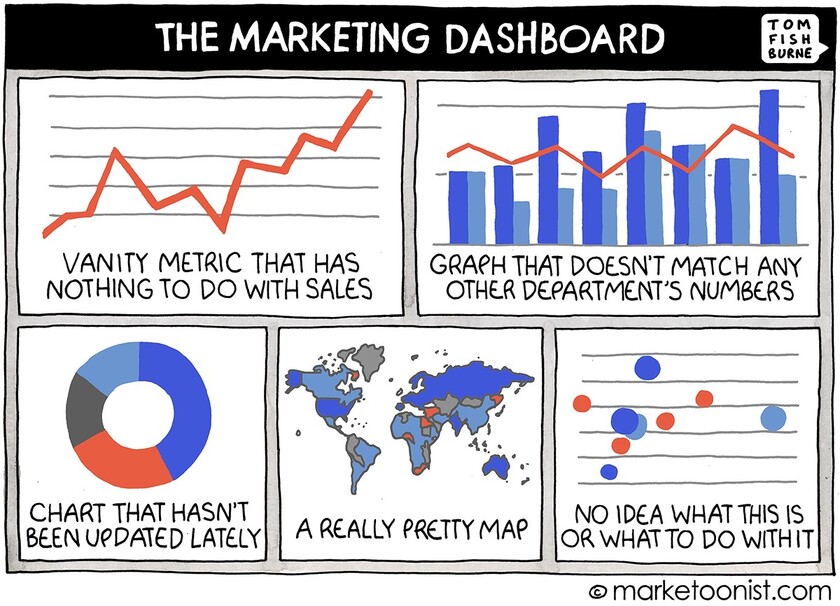KPIs are overused but underutilized. Companies often spend months trying to establish effective KPIs to improve business performance measurement, but they are often abandoned shortly after implementation because the numbers being tracked are ill conceived and not suitable, so users quickly lose interest.
Let’s dive into these frustrations and explore strategies to navigate them effectively.
1. Revenue is not a KPI
Obviously, it’s important to track high-level goals such as Revenue, ROI and so on. But KPIs need to track the activities you do that affect Revenue. Revenue is instead a KRI (Key Results Indicator) as it’s the result of many things. See also “The Difference Between KPIs and KRI’s and Why it Matters”.
Only measuring revenue or the number of customers is a mistake because it doesn’t tell you how you got there and what should be done next. To know that we need to evaluate the events that caused those results. Was it improved customer retention, higher conversion rates, more affective partners? Was it an increase in the number of sales calls, blog postings, ad placements, customers contacts or proposals?
Just as attribution is the process of determining which marketing touchpoints or interactions influenced a customer’s decision, the same is true for your KPIs. They need to measure specific activity, so you know what’s working and what’s not.
Only by identifying the actions or activities that directly influences revenue are you able to gain the insight you need to affect positive change. Measuring attribution is now possible.
2. Misalignment with strategic goals
One of the biggest obstacles in using KPIs effectively is the failure to align them with the organization’s overarching business strategy and objectives. KPIs need to be directly tied to the company’s strategic goals and priorities, not just random metrics that are easy to measure. If the KPIs are not clearly linked to the bigger picture, they will not drive the right behaviors and actions from employees. Establishing this clear line-of-sight between KPIs and strategy is critical for ensuring the KPIs are meaningful and impactful. Without this alignment, KPIs can become disconnected from the organization’s true priorities, leading to wasted effort and suboptimal performance. Often KPIs are poorly chosen and misused, producing numbers that no one understands or that aren’t very useful. Mostly, this is because KPIs are selected from a list or just reused from earlier measurements. But the activities that KPIs measure need to be based on what you are trying to accomplish; i.e. your Goal. Don’t pick KPIs from someone’s top-10 list! You have unique goals and therefore ways of reaching them. Instead, map out your strategy.
Users feel less overwhelmed when they can see the bigger picture and how they fit into it. This recognition boosts motivation and job satisfaction.
3. Subjectivity in KPI Selection
Marketing and sales will have different KPIs. And that’s fine. But choosing the right KPIs can feel like navigating a maze. Different teams and individuals may have their own ideas about what success looks like, leading to disagreements and confusion. Sales teams may prioritize metrics like revenue generated or deal closure rates, while marketing teams focus on metrics like lead generation and engagement. This subjectivity can hinder alignment and impact decision-making. To tackle this challenge, organizations need to foster open communication, collaboration, and a data-driven approach to selecting KPIs that align with overarching business goals.
A high-level goal such as “increase revenue by 12%” can be a common goal for both marketing and sales. Each team will contribute differently, and those activities can be measured uniquely. Both teams can hit their unique KPI targets to move toward the goal.
4. Focus on the Most Relevant and Impactful Metrics
Another common pitfall is the tendency to measure everything that is easy to track, rather than focusing on the most relevant and impactful metrics. Many organizations fall into the trap of monitoring a long list of vanity metrics, just because the data is readily available. This leads to information overload, with too many KPIs that distract from the truly critical measures of success. Identifying the vital few KPIs that best reflect progress towards strategic goals is much more effective than tracking a comprehensive set of metrics. By ruthlessly prioritizing the KPIs that matter most, organizations can ensure their teams are aligned and empowered to drive the right outcomes.
5. Establishing Accountability and Ownership for KPIs
For KPIs to be truly effective, there must be clear accountability and ownership assigned across the organization. Successful KPI implementation requires that individuals and teams are held responsible for the metrics that are relevant to their roles and areas of influence. Without this accountability, KPIs can become meaningless, as no one feels a sense of ownership of achieving the targets. Establishing clear roles, responsibilities, and consequences for KPI performance is crucial for ensuring the metrics drive the desired behaviors and outcomes. When people are accountable for the KPIs, they are more likely to take them seriously and work collaboratively to meet or exceed the targets. Communicating the strategic rationale for the KPIs, and how they contribute to the bigger picture, is also essential for driving engagement and ownership across the organization. When employees understand the purpose and significance of the KPIs, they are more motivated to take ownership and work diligently to achieve the targets.
Users feel more confident in their role when they have a clear roadmap and guidance on how their work ties into the organization’s goals which is motivating and leads to a sense of fulfillment.
Conclusion
Navigating the frustrations of KPI measurement in sales and marketing requires a strategic approach and a commitment to data-driven decision-making. By addressing challenges such as subjective KPI selection, lack of actionable insights, and misalignment with strategic goals, organizations can optimize their KPI strategies and drive meaningful business outcomes. Let’s embrace these challenges as opportunities for growth and improvement, steering our sales and marketing efforts toward success with informed and effective KPI measurement practices.
Our customers build Kartas to help map out their marketing and sales strategy and inform what actionable activities they should be focusing on and what the related KPIs are.






